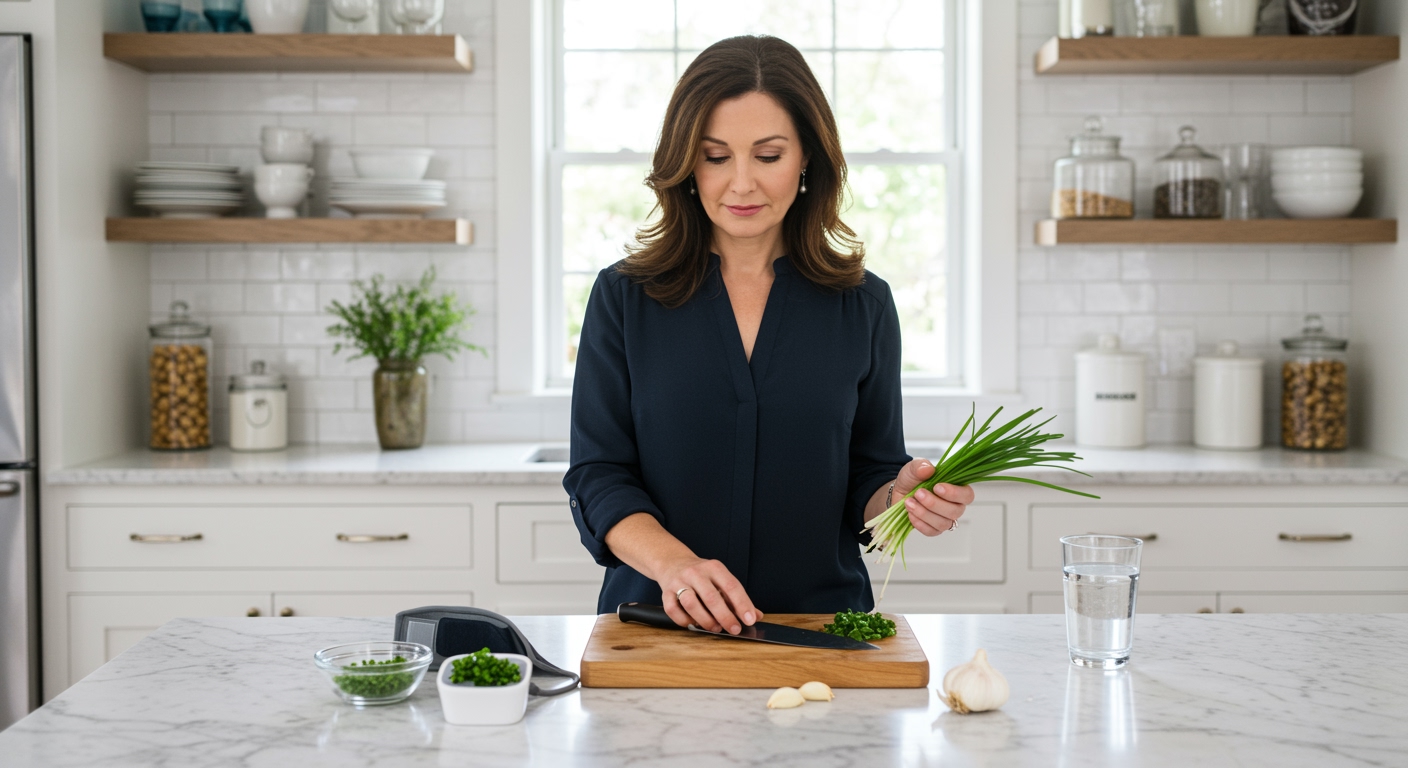✪ Key Takeaway: Hypotension patients can safely consume chives in normal cooking amounts without avoiding them completely.
Introduction
You reach for fresh chives to garnish your morning eggs when a nagging worry stops you cold.
Living with low blood pressure means questioning every food choice, and you wonder if this innocent-looking herb might push your already low numbers even lower.
Hi, I’m Abdur, your nutrition coach and today I’m going to explain exactly how chives affect hypotension patients and whether you need to worry about this common kitchen herb.
What Are Chives and How Do They Affect Blood Pressure?
Chives belong to the same family as onions and garlic, containing similar sulfur compounds that give them their distinctive flavor and potential health effects.
These green herbs contain allicin and other organosulfur compounds that can influence your cardiovascular system in subtle ways.
Research shows that allicin can cause mild vasodilation, which means it helps blood vessels relax and widen slightly.
This vasodilation effect typically leads to a modest reduction in blood pressure, similar to what happens with garlic consumption.
However, the concentration of these compounds in chives is significantly lower than in garlic, making their blood pressure effects much weaker.
For most people, the amount of chives used in typical cooking would not produce noticeable changes in blood pressure readings.
✪ Fact: Chives contain about 10 times less allicin than garlic, making their blood pressure effects minimal.
Should Hypotension Patients Worry About Chives?
The short answer is no, hypotension patients do not need to avoid chives in normal culinary amounts.
A typical serving of chives used as garnish or seasoning contains only 1-2 tablespoons of the fresh herb, which translates to minimal active compounds.
Your body would need to process large quantities of chives to experience any meaningful blood pressure changes.
Most hypotension patients have systolic blood pressure below 90 mmHg and diastolic pressure below 60 mmHg, but chives in cooking amounts would not push these numbers dangerously lower.
The real concern would arise only if you consumed chives in supplement form or ate unusually large amounts daily.
Even then, the blood pressure lowering effect would be gradual and mild, not sudden or dramatic like some medications.
Your body has natural mechanisms to maintain blood pressure within a functional range, and small dietary influences rarely override these systems.
✪ Pro Tip: Monitor your blood pressure regularly regardless of diet changes to track your individual patterns.
What About Chive Supplements or Large Amounts?
Chive supplements or extracts concentrate the active compounds far beyond what you would get from fresh herbs.
These concentrated forms could potentially cause more noticeable blood pressure effects, especially in sensitive individuals.
If you have severe hypotension with symptoms like dizziness or fainting, you should exercise more caution with any blood pressure-lowering substances.
Some people consume large amounts of chives in traditional dishes or as part of specific dietary practices.
In these cases, the cumulative effect might be more pronounced, though still unlikely to cause dangerous drops in blood pressure.
The key is understanding your individual response and monitoring how you feel after consuming larger quantities.
If you notice increased dizziness, fatigue, or other hypotension symptoms after eating chive-heavy meals, consider reducing your intake.
✪ Note: Always consult your healthcare provider before taking any herbal supplements if you have hypotension.
Are There Any Benefits of Chives for Hypotension Patients?
Chives offer several nutritional benefits that can support overall health without significantly impacting blood pressure.
They provide vitamin K for bone health, vitamin C for immune function, and folate for cellular processes.
The antioxidant compounds in chives help protect your blood vessels from oxidative damage, which supports long-term cardiovascular health.
For hypotension patients, maintaining good overall vascular health is important even when blood pressure runs low.
Chives also add flavor to foods without adding sodium, which helps you avoid excessive salt intake that some hypotension patients might use to raise their blood pressure.
The mild diuretic effect of chives is minimal and unlikely to worsen dehydration-related hypotension.
Including chives in a balanced diet can contribute to better nutrition without creating blood pressure management complications.
✪ Fact: Chives contain more vitamin K per gram than most other herbs, supporting bone and blood vessel health.
The Bottom Line
Hypotension patients can safely enjoy chives in normal cooking amounts without fear of dangerous blood pressure drops.
Food should enhance your life, not create unnecessary anxiety about every ingredient, and chives fall into the category of herbs that offer more benefits than risks for most people.
I would love to hear about your experiences with herbs and hypotension management, so please share your thoughts or questions in the comments below.
References
At NutritionCrown, we use quality and credible sources to ensure our content is accurate and trustworthy. Below are the sources referenced in creating this article:
- Cleveland Clinic: Low Blood Pressure (Hypotension)
- DoveMed: 7 Health Benefits of Chives
- Lybrate: 8 Health Benefits of Chives You Must Know About
- Cymbiotika: Understanding the Side Effects of Chives: A Comprehensive Guide





